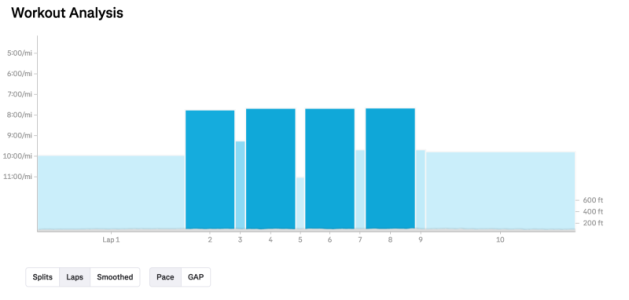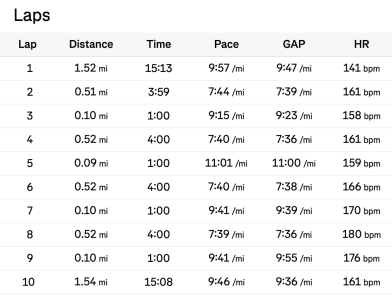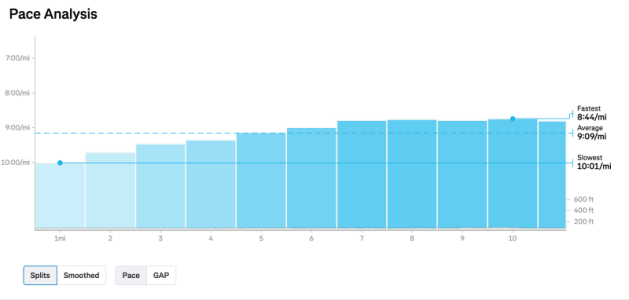Maybe I have a training philosophy now!
In which...I apologize in advance 
I feel like all my podcasts have been talking about training philosophy, and it got me thinking. Do I have a training philosophy?
On the one hand, it seems like my knowledge of training principles consists mainly of bits and pieces from various sources that I have sort of stitched together into a not-entirely-cohesive whole. It's like a quilt! A quilt made of occasionally clashing pieces, with a few holes. Does a messy sort of metaphorical blanket count as a training philosophy?
On the other hand, after making four or five plans now (depending on how you count), I think I have developed a certain style, if you will. Which is kind of like having a training philosophy. And if I didn't have a training philosophy, there would be no reason for me to write my own plans - I could just use someone else's.
View attachment 913734View attachment 913735View attachment 913736
Trying to take a selfie with my dog is a whole process.
On that note, time for a slight detour! I want to take a minute (update from later Kate doing the proofread: this ended up being way longer than a minute) to talk about other training philosophies and why I don't just use those plans, which would be a lot easier, though obviously less fun for everyone (because I'm sure all of you love seeing yet another training discussion in my journal

).
Higdon: I would call this the "just the basics" training philosophy. I have used one of his plans (the novice 2 HM plan, according to this journal, which I had to check because it was two years ago and I forgot). I think his plans are fine, ish, especially if you're just starting out. The plan I used was pretty boring, which is a big reason I didn't try any others. Plus, the only non-easy running in the plan was at HM pace, which I think isn't the best strategy (variety is good, and running faster than race pace is important). I know some of his other plans have a little more variety in paces, but they still seem pretty formulaic, which I don't find very engaging.
Daniels: I would say Daniels is systems rather than race-pace focused, which is a philosophy I've started to incorporate more into my own plans. In other words, most of his workouts include running at threshold and/or VO2 max and/or marathon pace (which is I think more a substitute for aerobic threshold/LT1 than actually targeted at the marathon specifically). I do actually use many of his workouts and theories as a basis for my own, but his plans can be kind of confusing and contradictory. Plus, he doesn't really seem to do cutback weeks, which I think are important, especially during marathon training.
Hansons: The Hansons basically invented the "cumulative fatigue" approach. It's interesting - capping your long runs at 16 miles during marathon training seems kind of crazy - but I do think it can work. I thought about doing this one for my marathon training (the first time), but it also has a few flaws. First, there's a weird jump in mileage maybe a third of the way through the plan, which I didn't like. Second, I think 16 miles is a little short for what I want from marathon training. I've found 18 to be fine, but I've really felt a difference in fatigue over those last couple of miles in training. I think the extended pounding does prepare you better without noticeably increasing injury risk. And finally...this plan is also kind of repetitive. There are essentially three workouts - strength, speed, and tempo - and you just do different intervals/durations of those over the whole plan. I also don't love having two workouts a week in addition to the long run.
Pfitz: I don't have the book here in Orlando, so I can't necessarily go into much detail because I don't remember it all that well, but his plan is definitely geared towards fast runners. I didn't use it because doing a 7-mile threshold run, which is a real thing that he calls for, would be pretty stupid for someone with my paces.
Matt Fitzgerald (a la Run Like a Pro): Matt Fitzgerald of course popularized 80/20 training in the running world. And for the most part I actually liked his marathon plan, which had a lot of variety in workouts. The main problem I had with it was that the level 1 plan had zero marathon-pace runs, and while the level 2 and 3 plans did have some M pace, they also called for 7 days a week of running, which I am strongly opposed to doing. Rest is important.
Galloway: Okay. Before I get myself in too much trouble here, let me clearly separate the Galloway
method from Galloway
training. The Galloway method (i.e. run/walk/run) is great. It's not for me, but I'm happy that it works well for so many people for all different kinds of reasons. There's nothing inherently better about continuous running; run/walk is just as valid. That said, is it terrible if I think the basic Galloway training plans are just...bad?

Let me splain.
First, I don't think three days a week is enough to train for a marathon unless you're also cross-training. Four, okay, possible. Five, no problem. Six, perfect (not that I'm biased or anything). Three just doesn't let you accumulate enough mileage. Also, running up to 26 miles in training?? I do think the run/walk method helps with recovery, but not enough to have one run make up...what is it, like 70% of your mileage for the week? Yeesh. And I've heard Jeff Galloway on Rise & Run several times, and he seems like a lovely person, but he keeps talking about how hill sprints are enough strength training for runners. (This is objectively incorrect. Running is catabolic, meaning it breaks down muscle. Strength training is anabolic, meaning it builds muscle. You cannot use catabolic training for anabolic purposes. What you get from hill sprints is practice using explosive power, which is good but not a substitute for lifting heavy things.) Maybe customized training is better, but based on the free plans, I would not recommend this training to anyone.
Maybe if you just want to finish, but even so. Definitely not if you want to actually get faster. Run/walk yes, training plan no.
I know there are other popular plans out there -
McMillan comes to mind - but I don't have access to them so I can't really talk about the philosophy behind them. From the articles I've read on his site, McMillan seems focused on mini-cyles of training (speed, strength, specific, etc.) within a training block. I think it's important to touch on all those aspects of running, but I'm not sure you want to separate them like that. I've certainly taken principles from him, though, and all of these coaches (except for Galloway, unless you count principles of what not to do

).
View attachment 913737
Some early practice with the wagon
Anyway, back on track, now that I've gotten a whole rant off my chest. Let's say I have a training philosophy, ish! So...what is it?
First, there are the basic things. Balance of easy and hard running. Strides. Occasional cutback weeks. Fueling for runs that take more than 90 minutes. Rest days. I guess these aren't necessarily universal, because I just talked about how the plans above didn't do them, but they're pretty common. And they're part of my training principles too.
But what sets my "training philosophy," such as it is, apart?
 Relatively high mileage
Relatively high mileage. By "relatively" I mean I run 8-10 hours a week during marathon training (and a bit less as goal distances get shorter), which I get the impression is kind of a lot for a recreational runner. I think this works
pretty well for me, though I have tended to pick up nagging aches and pains late in the marathon training cycle. However, I would also note that my easy paces have typically gotten faster as I get further into a training plan, even at similar HRs. Sometimes that's because the weather is also getting cooler, but not always. So on balance, I think higher mileage works for me.
 Variety is the spice of life
Variety is the spice of life. (A rainbow (variety) was the best I could do for this one. I looked for a spice shaker, but that's apparently not an emoji that exists.) If I just ran at my goal race pace every time I did a workout, I would be super bored. And it wouldn't be very helpful. I think you have to run faster than goal pace, or goal pace feels too hard. And you want to run slower too, to build more speed endurance. And you, or at least I, want to change up the workouts even using the same paces, because if I'm doing the same thing every week, what is even the point? I particularly like mixing multiple paces into one workout, as you might have observed.
 Run long
Run long. I like long runs. Is that weird? I like long run workouts and I also like just going out and running for two hours or more at a relaxed pace. (Usually, anyway.) But even if I didn't like long runs, I would still do them, because even a 5K is mostly aerobic. Building your aerobic endurance will make you faster overall (as long as you're not overdoing it). So even for a 5K, I'm probably doing some two-hour long runs, despite this being approximately four times farther than a 5K. On the opposite end of the spectrum, though, I haven't done any 20-milers in training ever, because I feel like I run enough throughout the week that 18 is sufficient for a marathon. I will probably include 20-milers in marathon training at some point in the future, but my experience tells me it's not essential. It might even be counterproductive for some people - while I don't think there's necessarily a hard limit on what percentage of your weekly mileage your long run should be, I doubt it's great to have it be more than 50%. So I would argue you'd need to be doing significantly more than 40 miles a week to make a 20-mile long run a good idea.
 To go faster at races, build faster systems
To go faster at races, build faster systems. To your body, there's nothing particularly significant about 5K pace or half marathon pace or whatever. But your body does have paces where things shift physiologically. (I did
a whole post about this a while back.) If you can make those physiological paces faster, your race paces will get faster as a result. I tend to do most of my workouts with these "systems" paces (e.g. lactate threshold, VO2max, etc.). I'll do some work at race pace for practice, but for me this is complicated by the fact that I really don't know what my race pace will be until I actually run it. I've kind of shifted away from time goals overall - I still think about them, but I try not to race with them in mind. I'd rather let my body decide how fast it can run on race day. I feel like I have a better sense of where my physiological paces are, so I'm better off training at those paces. Which leads to a corollary:
 Yes, you have to run fast
Yes, you have to run fast. And by "fast" here I mean "faster than 5K pace." Even if you're training for a marathon. Some people probably only need a little bit of fast sprinkled into their training. For me, it's more like every couple of weeks, because speed is not really my strong suit. But just as two-hour long runs will make you better at 5Ks, short intervals at mile pace will make you better at marathons. Sure, you could run a 5K without a significant long run, and you could run a marathon without running mile pace once, but they will help you get better. Sad but true.
 Strength training is part of run training
Strength training is part of run training. Now, I don't think strength training necessarily makes you a faster runner directly. But it does make you a more resilient runner, and help you improve your form. So you're less likely to get injured and therefore more likely to be able to keep running consistently, which does make you faster. And again, you cannot replace strength training with more running - they have completely opposite impacts. Actually, probably the more running you do, the more strength training you need, because you need to rebuild what the running broke down. That means lower body strength and core work, in particular, are essential. I guess you could skip upper body strength if you really wanted, but then you'd be all unbalanced and that would be weird

. So: strength training is not cross training. Other aerobic training is cross training. Strength training is a complement, not a substitute.
 Races are special
Races are special. I think a major reason why I've set a PR in almost every race over the past two and a half years is because I don't race all that often. I do run in more races than I actually race, but I really only go all-out a few times a year. First, that allows me to build up to my goal race without having to recover from other races in the middle of a training block. And second, human bodies only have a few full-out efforts to give a year. I could race more often and probably even set more PRs, but I think less racing makes the racing I do better. This is of course a matter of priorities - some people really enjoy racing, so they do it lots, and that's fine too. But my goal is to get faster at racing, so I'm very selective about when I do it.
In summary, I'm all about mileage, long runs, lots of different workouts at systems paces, and strength training. And I don't see these opinions changing significantly going forward. However, I'm always learning more from various podcast and occasionally books. If you're interested in the science behind training principles, I would highly recommend Some Work, All Play, which is giving me lots of new things to think about, like uphill treadmill finishers, steady-pace additions to workouts, high-carb fueling, and more. (Also David and Megan are fun to listen to.) So I'm sure if I came back to my theoretical training philosophy in a year, I would have more to add.
View attachment 913739
When I finish a container of peanut butter or yogurt, I give it to the dog to clean. He gets really into it.
I would also say that the details are maybe 5% of getting faster. The biggest key overall is running consistently. If you're only training in the 16 weeks or whatever before a race, your progress is going to be slower. Then when it does come to specific training plans, it's mostly just picking a plan and sticking to it. Questions like "Should I do an 18 or 20 mile long run?" and "How much speed work do I need?" make a pretty small difference compared to 1) having a plan in the first place and 2) following the plan.
And what works well for me might not be the best option for other people. In other words, you do you. If you like Hansons, great. If you really, really want to use a Galloway plan, go ahead. Those 0.1% differences are significant for the people competing at the very top level, but they're not such a big deal for the rest of us. While there's probably no one out there who shouldn't be doing strength training or who should run 60% hard in a week, the smaller differences between plans aren't that important in the scheme of things. It's more about finding what works for you.
I guess I could conclude from all that that my training philosophy doesn't really matter, but I think it's more that my training philosophy is for me. Your training philosophy could be totally different, and that's fine. If it is, tell me about it, because maybe there's something I hadn't thought about, or maybe we'll just have an interesting conversation. As you might have noticed, I like talking about training principles. If you're still reading, hopefully you do too. Or maybe you're just here for the dog photos


 Since I am looking toward trying to do 25 - 50ks with more like 4000 ft elevation gain (maybe eventually more), I am starting to get into the realm of what the book is talking about, but really just barely. So many of the specific workouts, etc., are not appropriate at my level.
Since I am looking toward trying to do 25 - 50ks with more like 4000 ft elevation gain (maybe eventually more), I am starting to get into the realm of what the book is talking about, but really just barely. So many of the specific workouts, etc., are not appropriate at my level.





